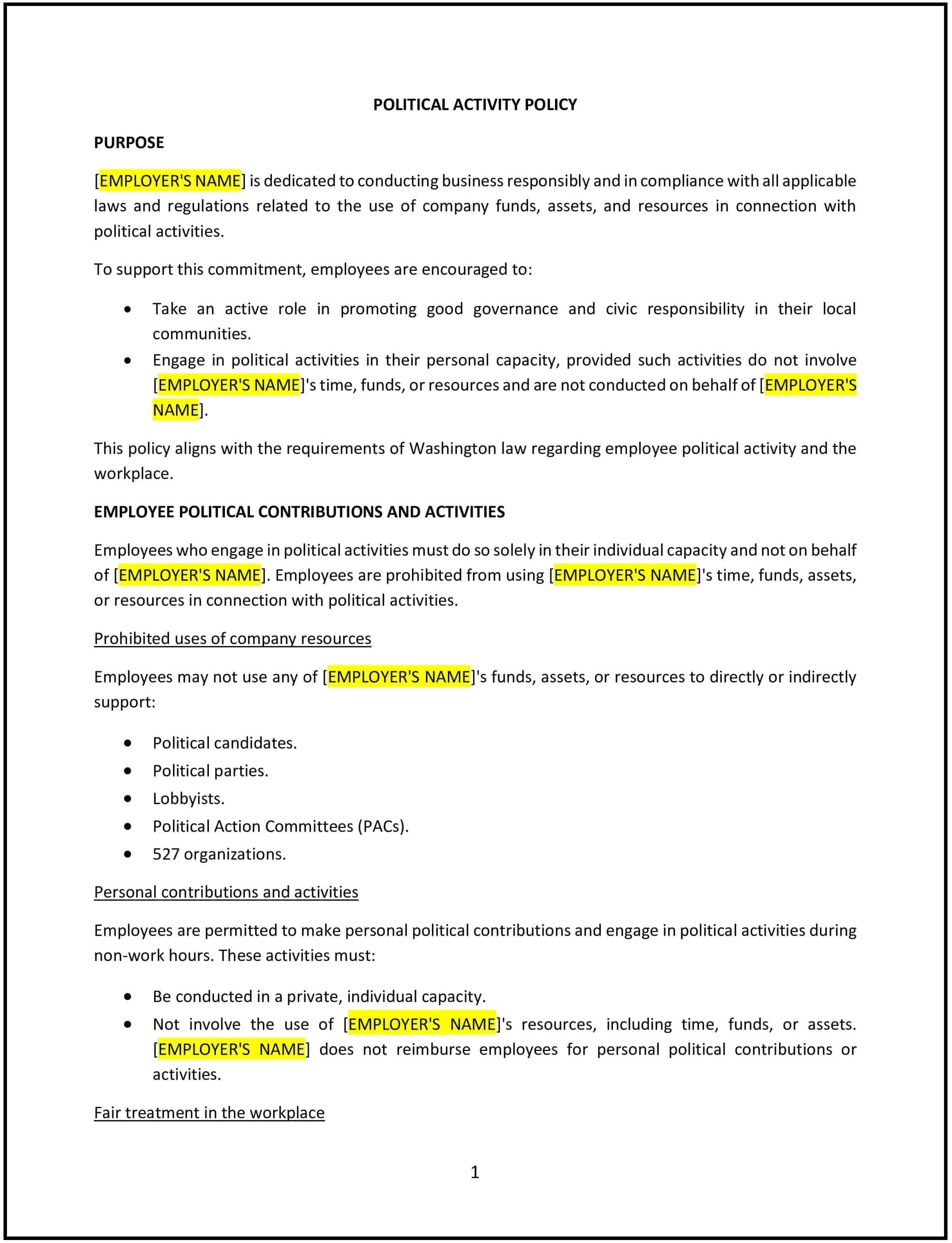Political activity policy (Washington): Free template
Got contracts to review? While you're here for policies, let Cobrief make contract review effortless—start your free review now.

Customize this template for free
This political activity policy is designed to help Washington businesses manage and regulate employee political activities in a manner that supports compliant with state and federal laws. The policy outlines the rules regarding political contributions, participation in political campaigns, and the use of company time and resources for political activities. It is intended to ensure that employees engage in political activities in a way that does not conflict with the interests of the company or violate any laws.
By adopting this policy, businesses can maintain a neutral and professional workplace, protect company resources, and minimize the risk of conflicts of interest related to political activities.
How to use this political activity policy (Washington)
- Define acceptable political activities: The policy should specify what types of political activities employees can engage in while working for the company, including participation in political campaigns, running for public office, making political contributions, and any other activities deemed relevant. The policy should also clarify that political activities should be conducted on personal time, not during working hours.
- Specify the use of company resources: The policy should prohibit the use of company resources, such as email, equipment, or office space, for political activities unless approved by management. It should ensure that company time and resources are not used for political campaigning or activities unrelated to business operations.
- Address political contributions: The policy should outline whether employees are permitted to make political contributions using company funds or resources. It should specify whether employees can make personal political contributions and under what conditions, and clarify that such contributions must be made on their own time and at their own expense.
- Ensure compliance with Washington and federal laws: The policy should comply with Washington state laws and federal regulations regarding political activities, including rules on campaign finance, lobbying, and other political engagement. The policy should also specify any legal restrictions that apply to the company or its employees regarding political activities.
- Establish guidelines for political endorsements: If the company engages in political endorsements or political activities, the policy should clarify how such endorsements are handled, including whether employees can represent the company in political matters or campaigns. It should also clarify that any political activity on behalf of the company must have prior approval from management.
- Prevent conflicts of interest: The policy should address the potential for conflicts of interest between employees' political activities and the company’s business interests. It should provide guidelines for how to handle situations where an employee's political involvement might affect their work or the company’s interests.
- Review and update regularly: Periodically review and update the policy to ensure it remains compliant with Washington state laws, federal regulations, and any changes in company operations. Regular updates will help ensure the policy stays relevant and effective.
Benefits of using this political activity policy (Washington)
This policy offers several benefits for Washington businesses:
- Protects company resources: The policy ensures that company resources are not misused for political activities, protecting the organization from any legal risks or reputational damage.
- Promotes a neutral workplace: By setting clear guidelines, the policy helps create a neutral workplace where employees can freely express their political opinions on their own time without affecting the company’s reputation or business operations.
- Reduces conflicts of interest: The policy helps prevent conflicts of interest by addressing situations where an employee’s political activities could influence their work or the company’s operations.
- Enhances legal compliance: The policy helps enhance compliance with Washington state laws and federal regulations regarding political activities, reducing the risk of legal penalties or disputes.
- Supports transparency and fairness: By outlining clear rules for political participation, the policy ensures that all employees are treated fairly and consistently, regardless of their political views.
- Enhances company reputation: A clear and balanced political activity policy demonstrates the company’s commitment to maintaining a professional, neutral workplace, which can improve its reputation as an ethical and responsible employer.
Tips for using this political activity policy (Washington)
- Communicate the policy clearly: Ensure all employees are aware of the political activity policy and understand the company’s expectations regarding political participation. Include the policy in the employee handbook, review it during onboarding, and provide periodic reminders.
- Be transparent about restrictions: Clearly communicate the specific restrictions on political activities, such as prohibiting the use of company resources for political campaigns or donations. Ensure that employees understand what is permissible and what is not.
- Encourage personal political engagement: The policy should encourage employees to engage in political activities on their own time, while respecting the company's interests and avoiding conflicts of interest. Support employees in their personal political endeavors as long as they are conducted outside of working hours.
- Monitor compliance: Regularly monitor the implementation of the policy to ensure that political activities are not interfering with company operations. Take corrective action if employees are found to be using company resources or time for political purposes without approval.
- Address conflicts of interest: Employees should be informed of the process for addressing conflicts of interest if their political activities appear to interfere with their work or the company’s interests. The policy should outline the procedure for resolving such conflicts in a fair and transparent manner.
- Review and update regularly: Periodically review the policy to ensure it remains compliant with Washington state laws, federal regulations, and any changes in the company’s operations. Regular updates will help keep the policy relevant and effective.